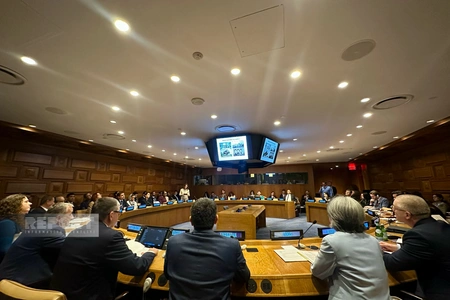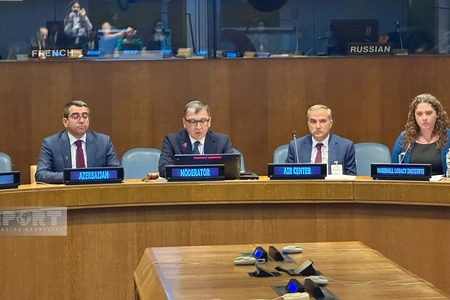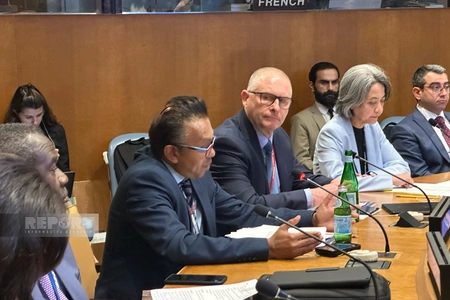Briefing on Azerbaijan's landmine problem held at UN headquarters in New York
- 05 April, 2025
- 09:12

A briefing dedicated to Azerbaijan's landmine problem was held at the United Nations Headquarters in New York as part of the International Day for Mine Awareness and Assistance in Mine Action, observed annually on April 4.
According to the American Bureau of Report, the event was organized by the Permanent Mission of Azerbaijan to the UN and the Center of Analysis of International Relations (AIR Center). It focused on saving lives through humanitarian mine clearance efforts in Azerbaijan.
Participants included Anar Mutallimov, Deputy Head of the Military-Political Affairs Department of Azerbaijan’s Ministry of Foreign Affairs; Farid Shafiyev, Chairman of the AIR Center; Tofiq Musayev, Permanent Representative of Azerbaijan to the UN; representatives of various UN specialized agencies; Rita Gunaryati Lubis, Deputy Director of the United Nations Mine Action Service (UNMAS); Devanand Ramiah, Head of the UNDP Crisis Bureau; Alice Becker, Executive Director of the Marshall Legacy Institute; representatives of UN member states; and accredited journalists.
In his remarks, Tofiq Musayev emphasized that more than 13% of Azerbaijan’s territory is contaminated with landmines and unexploded ordnance. Since November 2020, there have been 388 landmine explosions in the country, resulting in 70 deaths and 318 serious injuries. The diplomat recalled that Azerbaijan has declared humanitarian demining a national-level 18th Sustainable Development Goal (SDG) and noted that three international conferences in this field had been organized in cooperation with the UN.
Information was also shared with ambassadors and UN representatives about a resolution recently adopted by the Human Rights Council, titled “The Impact of Anti-Personnel Mines on Human Rights,” initiated by Azerbaijan.
A short film was presented at the event showcasing demining and restoration efforts in mine-contaminated areas.
In his presentation, Farid Shafiyev provided an in-depth overview of Azerbaijan's landmine issue, noting that the country is among the most heavily mine-contaminated in the world, and highlighted key aspects of humanitarian demining.
Anar Mutallimov spoke about Azerbaijan's international initiatives in mine action and stressed that the mine threat hinders the safe return of internally displaced persons.
UNDP representative Devanand Ramiah noted the increasing international financial support, the importance of involving women in demining efforts, and long-term cooperation with ANAMA (Azerbaijan National Agency for Mine Action). Alice Becker reported that her institute had delivered 93 mine detection dogs to Azerbaijan, contributing to the clearance of significant areas.
UN representatives praised Azerbaijan’s initiative to create an international demining center and noted that the European Union had allocated 10 million euros for this purpose. Rita Gunaryati Lubis highlighted Azerbaijan’s leadership in this field.
The event included discussions on the mine threat, humanitarian efforts, and international cooperation. Azerbaijan received high praise for its contribution to global demining efforts.







